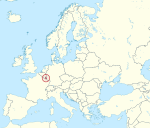Portal:Luxembourg/Intro

|

|

| |
Luxembourg (/ˈlʌksəmbɜːrɡ/ LUK-səm-burg; Luxembourgish: Lëtzebuerg [ˈlətsəbuəɕ] ; German: Luxemburg [ˈlʊksm̩bʊʁk] ; French: Luxembourg [lyksɑ̃buʁ] ), officially the Grand Duchy of Luxembourg, is a small landlocked country in Western Europe. It is bordered by Belgium to the west and north, Germany to the east, and France to the south. Its capital and most populous city, Luxembourg City, is one of the four institutional seats of the European Union (together with Brussels, Frankfurt, and Strasbourg) and the seat of several EU institutions, notably the Court of Justice of the European Union, the highest judicial authority. Luxembourg's culture, people, and languages are greatly influenced by its much larger neighbors France and Germany; for example, Luxembourgish, a Germanic language, is the only national language of the Luxembourgish people and of the Grand Duchy of Luxembourg, French is the only language for legislation, and all three – Luxembourgish, German and French – are used for administrative matters in the country.
With an area of 2,586 square kilometers (998 sq mi), Luxembourg is Europe's seventh-smallest country. In 2024, it had a population of 672,050, which makes it one of the least-populated countries in Europe, albeit with the highest population growth rate; foreigners account for nearly half the population. Luxembourg is a representative democracy headed by a constitutional monarch, Grand Duke Henri, making it the world's only remaining sovereign grand duchy.
The County of Luxembourg was established in the 11th century, as a state within the Holy Roman Empire. Its ascension culminated in its monarch, Henry VII, becoming the Holy Roman Emperor in the 14th century. Luxembourg came under Habsburg rule in the 15th century, and was annexed by France in the 18th century. Luxembourg was partitioned three times, reducing its size. Having been restored in 1815 after the defeat of Napoleon, it regained independence in 1867 after the Luxembourg Crisis. (Full article...)
